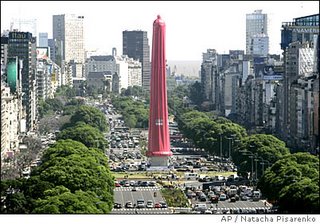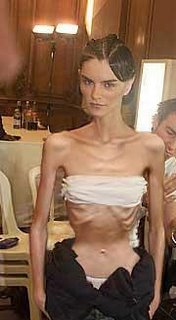Saturday, November 11, 2006
Sunday, November 05, 2006
Some facts about living in Buenos Aires and dont beleive the hype that is is a cheap city to live in,
The biggest myth I hear in the blogger world is that Buenos Aires is a cheap city to live long term for foreigners.
If you go by basic living expenses there are very little bargains here.
For example by far your biggest expense will be rent in Buenos aires and if you come here thinking that you will find a apartment for around 300 dollars a month you will be very disapointed.
You will be very lucky to find an apartment for under 600 dollars a month in any decent area and share accomodation is nearly impossible to find.
And as for buying properties in Buenos Aires prices are now around 2000 to 2500 a square metre in most of the northern areas from recoleta to belgrano.
Argentines like to blame foreigners for putting up the prices of properties but according to the real estate institute of argentina over 85 percent of all real estate purchases in argentina are by argentine nationals.
There seems to be a negative impression blaming foreigners for all argentine woes when the fault very clearly lies in argentine society itself which has always favoured the higher classes.
The economic boom of the last 5 years has very clearly benefited them and the wealthy of argentina are richer than ever before and the economic crash of 5 years ago made many of them 3 times wealthier overnight.
With their great buying power they brought up as much cheap real estate they could lay their hands on and now they are laughing all the way to the bank.
I find it strange when argentine people tell me I am here because its cheap . Nothing could be further from the truth I am hear for many reasons monetary reasons do not have any impact on me .
To live long term as a foreigner be prepared for a lot of sacrifices . If you do not have decent capital to start your own business you will find the going very tough here . If you are a foreign traveller to argentina I suggest that you do visit as its the most incredibly beautiful country but be aware that your trip will be much more expensive than you probably planned on.
Good hotels are nearly as dear as european prices . Internal air travel is much much dearer than europe . Restaurants are cheaper in the main but certainly they are not the bargain that you might beleive.
Buenos aires is certainly worth a visit and you will be enchanted just be prepared to have enough money in store for your trip
Wednesday, November 01, 2006
Thursday, July 06, 2006
Buenos Aires the cult of image Anorexia and Plastic surgery
An in depth report coming soon from a city obsessed with plastic surgery and the shocking truth about anorexia nervosa in Buenos Aires

Buenos Aires is a strange city and difficult to understand. In many aspects its a immature place where you are judged solely on the very superficial.
As a long time visitor here I have been suprised at the superstars of television who are the so called role models of Argentine society. Take a look at night time television here and you will be overwhelmed by the very blonde wafer thin loud opiniated women who dominate Buenos Aires.
Image is everything here and if you visit Buenos Aires take a walk through recoleta barrio Norte and Palermo and you will see more facelifts per km than anywhere on earth.
I remember my first trip here in the 1980s and visiting the famous La Biela near recoleta cemetery and seeing many fur clad women with the tell tale signs of recent cosmetic surgery. I know of no other city where women so soon after their facelifts go out in public with black eyes and nose bandages . There is very little shame in having any work done here and portenos feel very proud to boast to the world their recent hospilisation.
Dr Jose Juri Argentinas leading cosmetic surgeon quotes From all of which one may fairly safely conclude that there is no country on earth where beauty, by whatever means and at whatever cost, is a greater priority in life. Why? Dr Juri has, as to all questions, a perfectly clear answer. 'Five reasons,' he says. 'Because the Argentine woman is very sophisticated and engages in a great deal of social activity; because here in Buenos Aires we do not consider ourselves Latin Americans but Europeans, and so we must look and dress the part; because the philosophy of looking after yourself is fixed in the minds of Argentine girls from a very early age; because there is enormous competitiveness among "las Argentinas"; and because good looks open the doors to love and money.'
Sonia Abadi, a psychoanalyst, is in no doubt that Argentine women are special. Old enough to be Micaela's mother, at least as glamorous as the young model, and 10 times as worldly, Abadi is a handsome woman with thick, lovingly coiffured hair, dressed for work in high heels and a hint of décolletage. Buenos Aires is the city with the highest proportion of psychoanalysts to people in the world (the obsession with beauty extends to the mind too ) and she is eminent in her field. She speaks French and English, has written books and addressed numerous international conferences. She is also a recognised authority on the history and culture of the tango, a dance she performs with properly melodramatic aplomb. She is, for the over-forties at any rate, the last word in the thinking man's crumpet.
'Can it have something to do with prostitution?' is the first thing she says when I ask her why she believes it is that Argentine women drive men wild like no others. Prostitution? I said suprised but am immediately reminded of Juri's point about the competitiveness of women, and their idea of beauty as the means to find love and money. 'Yes, prostitution,' she says, defiantly, provocatively, with a knowing smile . 'There's a big tradition of it in this country, and quite a recent one too.'
She then proceeds to give me a history lesson. In the late 19th and early 20th century European immigrants poured into Argentina, a destination then with as much potential and appeal as the United States. The first wave of immigrants were overwhelmingly single men 'whose most treasured commodity', Abadi says, 'was women'. A white slave trade duly flourished, not unlike the movement of women from eastern to western Europe that we see today, but on a more massive and organised scale. Whether aware or not what they were letting themselves in for, prostitutes-to-be were shipped south, typically from Poland or France. 'If Argentina remains to this day a deeply "machista" country,' Abadi says, 'it is because of the idea entrenched in the male psyche of woman as whore.'
It is an idea apparently embedded deep in the female psyche too. 'In Argentina we have been completely au fait with all the currents of women's liberation down the years and the role we have today is of course incomparable to the one we had 100 years ago. Women are as independent economically as they are in Europe but they continue to be very carnal, very coquettish. That is where the plastic surgery comes in - one more weapon in the armoury of attraction.'
Abadi is the perfect person to talk on this subject. On the one hand she examines the phenomenon of the Argentine woman with cold, scientific detachment, and on the other she is a perfect example of the breed herself . But is there not, I ask her, some contradiction between liberation and women's enslavement with their appearance?
'No, it's all been blended into one. The Argentine woman of today is liberated but she clings to her carnal femininity. Here you're never going to see a masculinised woman, dressed in imitation of a man, with close-cropped hair. It didn't happen even at the height of the feminist movement, 20, 30 years ago. Nor are you going to see the American Barbie type. When you see an attractive woman in America you see that, like Barbie, the beauty is superficial, superimposed. For the Argentine women it is organic. Beauty is incorporated into her way of being. That's why foreign men come here and fall in love.'
They may also find (and I speak from experience, I tell her) that beneath the physical charms there lurk a lot of unresolved complications, a lot of neuroses. Hence the limitless clientele for people in her profession; hence the proposition that, while it is one thing to fall in love with an Argentine woman, it is quite another to settle into a stable long-term relationship. God made Argentine women beautiful, I put it to Abadi, but to compensate he also made them hard work.
'Yes, I would not disagree,' she replies . 'There's a lot of possessiveness, a lot of jealousy and that desire that modern women everywhere have to do and to be everything. They want to be new and liberated and independent but they don't want to abandon anything of that old seductress identity. It causes conflict and anguish, because it means - yes - that you're attempting to be dependent and independent at the same time.'
Abadi's job consists in part in helping women to deal with this dilemma. 'In Europe and America the trend has been for women who evolve in the workplace to distance themselves from their bodies, from sex, from motherhood. In Argentina, women will never let go of that because they would feel frustrated as women. Now, I sense that today in Europe and America women are coming back, seeking to recover the differences between men and women. But the point about here is that we never moved from that initial point, we've always celebrated the differences.'
Abadi cites as an example the wife of the current Argentine president, Cristina Fernandez (who, unlike Hillary Clinton or Cherie Blair, does not use her husband's name - he is called Nestor Kirchner). Fernandez is a recently elected senator , and tipped some day to become president, in the tradition of the Perons. 'Look at her,' says Abadi, who sees her as an Argentine female archetype, 'every day she is more successful in the polls and every day her hair looks more beautiful. She is a big-time politician but is very, very attentive to her appearance. She is elegant in her dress, sensual in her style and that is not only accepted as a good thing in Argentina, it is valued - by both men and women.'
Abadi has found that the Argentine look beguiles not only male visitors from other countries, but women too. 'I've got three women patients who are company presidents,' she says. 'One of them is foreign. When she arrived she looked rather severe. Today, three years on, she is a lot more feminine and sensual. Another example: at the tango club I go to we have a number of French women who come over year after year. And year after year I see their look softening, their hair getting longer...' Coquetry is the essence of it all, she says. Coquetry with a clear target. 'Men are the audience . Argentine women cannot conceive of life without men.'
Two weeks after leaving Buenos Aires I find myself drinking tea in a chateau outside Paris with the chateau's owner, a debonair man in his late fifties who speaks English like a duke. I happen to mention that I have just been to Argentina. He has been there several times too, he tells me. Whereupon, inevitably, the subject of women comes up. Not only is the chateau owner as entranced as the rest of the hoi polloi, he has gone one better. His 'lady companion' is an Argentine. And what reflections has he made on the nature of Argentine women? Much the same ones, it turns out, as Sonia Abadi. 'It's not just that they are physically quite special,' he says. 'It's much more than that. They have managed to combine that confident quality of the modern, liberated woman with that old-style feminine allure that we all love.'
What neither the French aristo nor any of the other 30-odd men I spoke to for this article said was that Argentine women's beauty was false or manufactured. Men don't notice these things. They are not alert to whether a woman has submitted herself to plastic surgery. At first glance, watching those racehorses saunter around the Florida Street paddock, or even at a second or third glance - at a party, at work, over dinner, at the beach - most men's thoughts, on encountering an attractive woman, do not turn on whether she has had a lip, nose or a breast job any more than they do on whether she has mascaraed her eyelashes or rouged her cheeks. Men's brains at such moments are functioning at a less analytical, more primitive, level.
Argentine women understand this very well, which is one reason why they are so recklessly unrepressed about going to the surgeon to have their bodies artificially enhanced. And yet, the question remains, why do they bother, since they are so beautiful in the first place? The answer is that, like their country, they are confused about their identity: are they European, Latin American, or what? And their response to this confusion is to look ravishing. To them, it's a matter of patriotic duty
Wednesday, July 05, 2006
Gay Refugee first post in Argentina

Hey guys and gals
This is my first blog about life for gay men and women in Buenos Aires.
I have been living in Buenos Aires Argentina 18 months now and can tell you it has been a tremendous experience in many ways.
Life for gay men in the main is very good and tolerance amongst citizens of Buenos Aires called Portenos is high
Since 2002 there has been civil union here and President Kirchner is very supportive on gay issues.
Last year on worlds aid day The Obelisk one of the largest free structures in Buenos Aires was covered by a huge pink condom and got huge international attention.
I believe in 5 years time Buenos Aires will be in the top 3 gay destinations in the world and it is very apparent with the all new gay friendly places in town and gay hotels . Soon there will be the first 5 star gay hotel called Axel in the bohemian district of San Telmo.
Buenos Aires is changing rapidly and there is a ever increasing immigration from United States and Europe coming for the cheap housing and bohemian lifestyle.
Culturally Buenos Aires delivers in all facets . Its theatres and film industry is booming and the resurgence of former red light areas like Palermo Viejo to the trendy barrio it is today is nothing short of incredible.
I am here for the long haul and will keep you informed of my weekly aventures here







